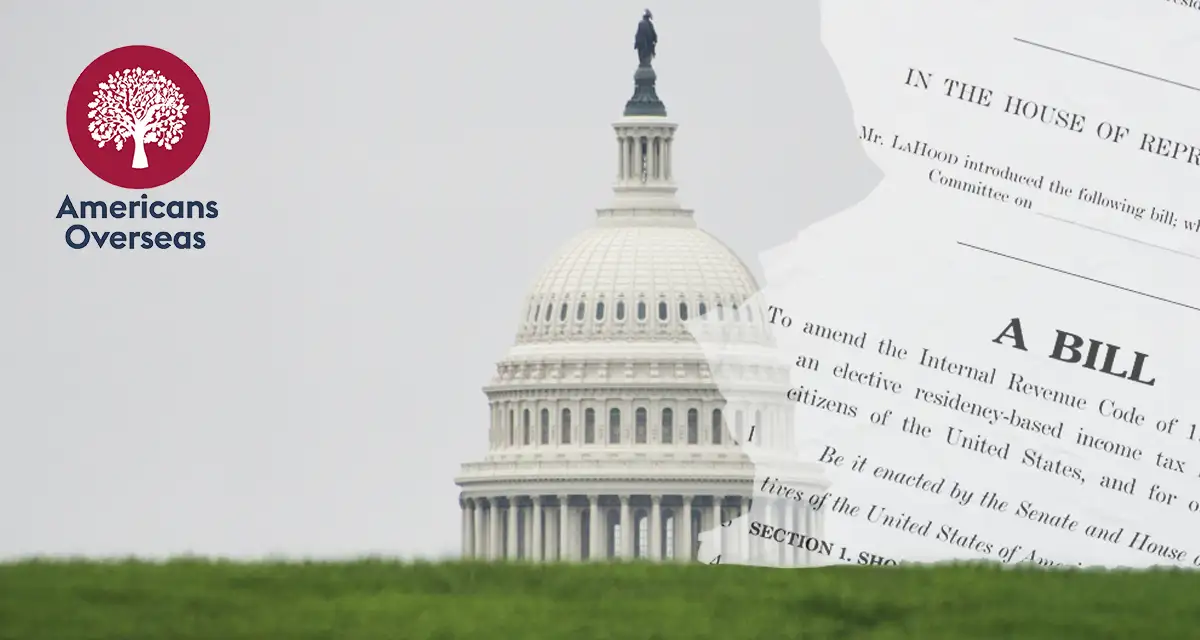
LaHood’s Tax Proposal for Americans Overseas: Still in Limbo

In early 2024, Representative Darin LaHood introduced the Residence-Based Taxation for Americans Abroad Act(H.R.10468), a legislative proposal aiming to replace the United States’ system of citizenship-based taxation with a residence-based taxation model for Americans living abroad. The bill has drawn attention from expatriate communities and advocacy organizations – but so far, it remains stalled in Congress.
What Is Residence-Based Taxation for Americans Abroad?
Unlike most countries, the U.S. uses a citizenship-based taxation (CBT) system, requiring all Americans — even those who live overseas — to file U.S. tax returns and potentially pay taxes on their worldwide income. Only Eritrea shares this approach.
While tax credits and exclusions like the Foreign Earned Income Exclusion help reduce double taxation, compliance costs and risks remain high. Many expats, including Accidental Americans, face costly reporting requirements and penalties — even when they owe no U.S. tax.
The residence-based taxation (RBT) proposal would change this system by taxing Americans based on where they live, rather than their nationality..
Key Features of the RBT Act (H.R.10468)
If passed, the Residence-Based Taxation for Americans Abroad Act would allow qualified expats to opt into a new system. According to the bill:
-
Foreign-source income would be excluded from U.S. taxation.
-
U.S.-sourced income (e.g., from investments or property in the U.S.) would remain taxable.
-
High-net-worth individuals (net worth above $13.61 million) would pay a one-time departure tax on global assets.
-
Long-term expats who have been tax compliant for five consecutive years could avoid the departure tax.
-
Applicants must certify full compliance under penalty of perjury.
The goal is to reduce the tax burden on Americans overseas while maintaining transparency and compliance standards.
Where Does the Bill Stand Now?
As of mid-2025, the bill has not been included in any major legislation, including the high-profile “Big Beautiful Bill” (BBB). There are two main barriers:
-
The bill has no official cost estimate (or “score”) yet from the Joint Committee on Taxation (JCT) or Congressional Budget Office (CBO).
-
Some provisions risk violating the Byrd Rule, a Senate rule restricting what can be included in budget-related legislation.
Representative LaHood has signaled that the bill may be revisited in upcoming legislation, possibly a tax extender bill expected later in 2025. A JCT score is expected this summer and may influence potential revisions to the proposal, though the core principles are likely to remain.
Support, Concerns, and Political Reality
Advocacy groups such as American Citizens Abroad (ACA) and Tax Fairness for Americans Abroad have praised the bill as a long-overdue step toward modernizing expat tax rules. They argue the bill would alleviate undue burdens on millions of U.S. citizens living abroad.
However, the bill faces opposition and skepticism. Critics warn that it could open the door to tax avoidance, especially among wealthy Americans who might shift assets overseas. Others express concern about the impact on IRS revenueand argue the bill may appear to benefit the wealthy more than middle- or lower-income expats.
Position of Americans Overseas
As an advocacy organization for Americans required to file U.S. tax returns, Americans Overseas recognizes the potential benefits of tax reform for millions of expatriates. However, the group remains cautious about the details of the proposed bill and its long-term implications. In previous years, several attempts have been made to ease the burdens on Americans abroad. Americans Overseas welcomes these developments, but to truly speak of progress, we need more information about the feasibility and conditions. We don’t want to give people false hope.
One thing is clear: in all the proposals, the U.S. is seeking transparency and information, and if you want to qualify for relief, you must, perhaps logically, you have to be tax compliant.
Americans Overseas continues to advocate for fair and achievable reforms that address the needs of expatriates without creating undue economic consequences. In the meantime, the organization urges Americans living abroad to remain compliant with existing laws and regulations, as any future reforms would likely require adherence to current rules as a condition for participation.
Contact us for more information
Read more:
- Wall Street Journal: Trump’s pledge to end double taxation for Americans Overseas – political stunt or real change?
- Trump’s Unlikely Promise: Ending Double Taxation for Americans Living Overseas
Sources:
- Proposal: Residence-Based Taxation for Americans Abroad Act
- Wall Street Journal: Trump Pledged to Cut Taxes for Expats. This Republican Wants to Make It a Reality.
- Residence-based taxation legislation introduced by Representative LaHood in the 118th Congress
Read more
View all newsAm I a US Person for tax purposes?
Find out in 2 minutes whether the IRS considers you a “US Person” and whether you may be required to file a US tax return — even if you live outside the United States.







